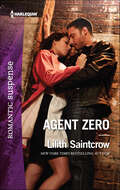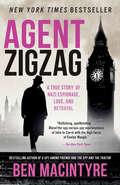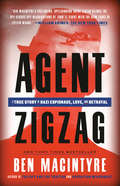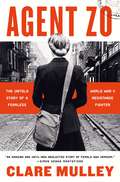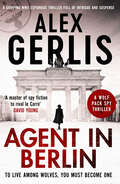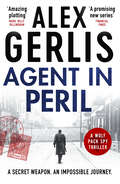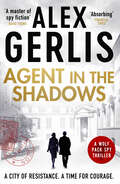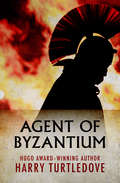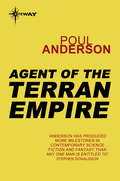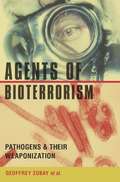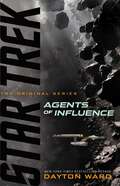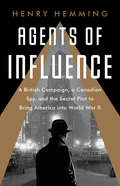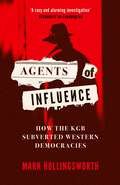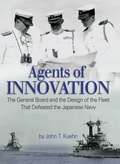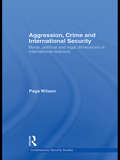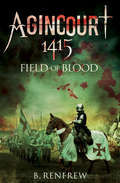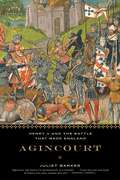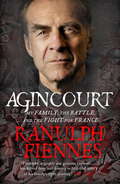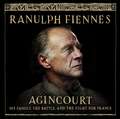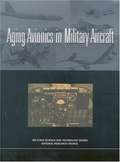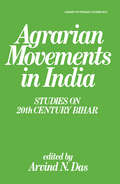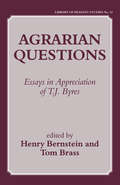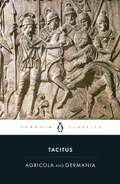- Table View
- List View
Agent Zero
by Lilith SaintcrowAn agent risks everything for a love he shouldn't feel in New York Times bestselling author Lilith Saintcrow's thrilling new romance! After barely surviving an IED, former US Army soldier Reese was whisked away by a shadowy agency and genetically enhanced. Now a "Super Agent"-smarter, faster, stronger, deadly-Reese executes his missions with precision. But when he's inexplicably drawn to a down-on-her-luck waitress, Reese learns he's not the emotionless man he once thought. One minute, Holly Candless is getting fifty-buck tips from her favorite hunky customer. The next, she's kidnapped, injected with something and rescued by Reese. Suddenly, they're on the run from the very government agency that wants Reese reprogrammed-and Holly dead. Keeping Holly alive is not only Reese's primary mission-it's his sole chance at love...and survival.
Agent Zigzag: A True Story of Nazi Espionage, Love, and Betrayal
by Ben MacintyreFor readers of World War II history, espionage, fans of John le Carré and Alan Furst, and of Ben Macintyre's more recent books. Eddie Chapman was a charming criminal, a con man, and a philanderer. He was also one of the most remarkable double agents Britain has ever produced. In 1941, after training as German spy in occupied France, Chapman was parachuted into Britain with a revolver, a wireless, and a cyanide pill, with orders from the Abwehr to blow up an airplane factory. Instead, he contacted M15, the British Secret service, and for the next four years, Chapman worked as a double agent, a lone British spy at the heart of the German Secret Service. Inside the traitor was a man of loyalty; inside the villain was a hero. The problem for Chapman, his spymasters, and his lovers was to know where one persona ended and the other began. Based on recently declassified files, Agent Zigzag tells Chapman's full story for the first time. It's a gripping tale of loyalty, love, treachery, espionage, and the thin and shifting line between fidelity and betrayal.
Agent Zigzag: A True Story of Nazi Espionage, Love, and Betrayal
by Ben Macintyre&“Ben Macintyre&’s rollicking, spellbinding Agent Zigzag blends the spy-versus-spy machinations of John le Carré with the high farce of Evelyn Waugh.&”—William Grimes, The New York Times (Editors&’ Choice) &“Wildly improbable but entirely true . . . [a] compellingly cinematic spy thriller with verve.&”—Entertainment WeeklyONE OF THE TEN BEST BOOKS OF THE YEAR: Entertainment WeeklyONE OF THE BEST BOOKS OF THE YEAR: The New York Times Book Review, The Washington PostEddie Chapman was a charming criminal, a con man, and a philanderer. He was also one of the most remarkable double agents Britain has ever produced. In 1941, after training as German spy in occupied France, Chapman was parachuted into Britain with a revolver, a wireless, and a cyanide pill, with orders from the Abwehr to blow up an airplane factory. Instead, he contacted M15, the British Secret service, and for the next four years, Chapman worked as a double agent, a lone British spy at the heart of the German Secret Service. Inside the traitor was a man of loyalty; inside the villain was a hero. The problem for Chapman, his spymasters, and his lovers was to know where one persona ended and the other began. Based on recently declassified files, Agent Zigzag tells Chapman&’s full story for the first time. It&’s a gripping tale of loyalty, love, treachery, espionage, and the thin and shifting line between fidelity and betrayal.
Agent Zo: The Untold Story of a Fearless World War II Resistance Fighter
by Clare MulleyThe incredible and inspiring story of Elzbieta Zawacka, the World War II female resistance fighter known as Agent Zo.During World War II, Elzbieta Zawacka—the WW2 female resistance fighter known as Agent Zo—was the only woman to reach London as an emissary of the Polish Home Army command. In Britain, she became the only woman to join the Polish elite Special Forces, known as the "Silent Unseen.&” She was secretly trained in the British countryside, and then she was the only female member of these forces to be parachuted back behind enemy lines to Nazi-occupied Poland. There, while being hunted by the Gestapo (who arrested her entire family), she took a leading role in the Warsaw Uprising and the liberation of Poland. After the war, she was discharged as one of the most highly decorated women in Polish history. Yet the Soviet-backed post-war Communist regime not only imprisoned (and tortured) her, but also ensured that her remarkable story remained hidden for over forty years. Now, through new archival research and exclusive interviews with people who knew and fought alongside Agent Zo, Clare Mulley brings this forgotten heroine back to brilliant life—while transforming how we value the history of women resistance fighters during World War II.
Agent in Berlin: 'A master of spy fiction to rival le Carre' David Young (Wolf Pack Spies)
by Alex GerlisTo live among wolves, first you must become one… An unmissable new spy thriller from best-selling master of the genre, Alex Gerlis.War is coming to Europe.British spymaster Barnaby Allen begins recruiting a network of agents in Germany. With diplomatic relations quickly unravelling, this pack of spies soon comes into their own: the horse-loving German at home in Berlin’s underground; the young American sports journalist; the mysterious Luftwaffe officer; the Japanese diplomat and the most unlikely one of all... the SS officer’s wife.Despite constant danger and the ever-present threats of discovery and betrayal, Allen’s network unearths top-secret plans for a new German fighter plane – and a truly devastating intelligence prize... an audacious Japanese plan to attack the United States. But can they prove it?The race is on.An unputdownable and atmospheric Second World War espionage thriller, Agent in Berlin will grip you to the very end. Perfect for readers of David Young, Robert Harris and Rory Clements.Praise for Agent in Berlin'Gerlis proves himself a master of spy fiction to rival John le Carré, Robert Harris and other leading lights with this gripping and entertaining novel set mostly in the frenzied world of pre-war Berlin' David Young, author of Stasi Child'Everything slots together perfectly in this hugely atmospheric and powerfully character-driven story set in Germany at the rise of Nazism ... a brilliant new addition to the genre' Chris Lloyd, author of The Unwanted Dead'Amazing plotting, packs a real punch' Mark 'Billy' Billingham, Sunday Times bestselling author of The Hard Way'The first volume of a promising new series, Alex Gerlis handles an ensemble cast with panache' Financial Times'An unmissable spy thriller from bestselling master of the genre Alex Gerlis' Spybrary Podcast
Agent in Peril (Wolf Pack Spies)
by Alex GerlisTo what lengths will the British go to smuggle a secret weapon into Nazi Germany? An unmissable Second World War thriller from bestseller Alex Gerlis.'Absorbing ... Gerlis directs his cast with verve' Financial TimesHiding in the horror of Warsaw’s Jewish Ghetto with his family, scientist Roman Loszynski has a secret: a means of making aerial bombing raids frighteningly accurate. Codenamed Tatra, it could change the course of the war.With British agent Jack Miller now in Switzerland, back in Berlin undercover spy Sophia von Naundorf is determined to escape Germany come what may. As the RAF look to destroy the Ruhr through its bombing raids, Barnaby Allen and British intelligence will need everything Jack and Sophia have to help find, test and deploy these devices.But that will mean getting Loszynski out of Poland, and themselves re-entering the Reich. Both seem, on the face of it, impossible, desperate missions filled with danger. Every second a chance for discovery.Every second a moment of peril.An intense and unputdownable espionage thriller from modern master Alex Gerlis, this is perfect for readers of Robert Harris, Charles Cumming and Rory Clements.
Agent in the Shadows (Wolf Pack Spies)
by Alex GerlisThere’s a traitor in the pack… Who can you trust? The extraordinary final instalment of the Wolf Pack series. June, 1943. In Lyon, the capital of the French resistance, a secret meeting is held under orders from General de Gaulle. The objective is to unite all resistance factions. The future of France is on the line. But when the meeting is raided by the Gestapo under Klaus Barbie, the 'Butcher of Lyon', the plan disintegrates and the leaders are captured. The movement has been betrayed. There is a traitor in Lyon. British undercover agents Jack Miller and Sophia von Naundorf are sent to France. They must find the informer and save the resistance. But the Gestapo is on the hunt. More traitors emerging from the shadows. The net is closing.This unmissable espionage thriller from modern master Alex Gerlis is perfect for readers of Alan Furst, Charles Cumming and Rory Clements.
Agent of Byzantium
by Harry TurtledoveFrom the New York Times–bestselling &“standard-bearer for alternate history&”: A spy takes on the enemies of the Byzantine Empire (USA Today). In another, very different timeline—one in which Mohammed embraced Christianity and Islam never came to be—the Byzantine Empire still flourishes in the fourteenth century, and wondrous technologies are emerging earlier than they did in our own. Having lost his family to the ravages of smallpox, Basil Argyros has decided to dedicate his life to Byzantium. A stalwart soldier and able secret agent, Basil serves his emperor courageously, going undercover to unearth Persia&’s dastardly plots and disrupting the dark machinations of his beautiful archenemy, the Persian spy Mirrane, while defusing dire threats emerging from the Western realm of the Franco-Saxons. But the world Basil so staunchly defends is changing rapidly, and he must remain ever vigilant, for in this great game of empires, the player who controls the most advanced tools and weaponry—tools like gunpowder, printing, vaccines, and telescopes—must certainly emerge victorious. A collection of interlocking stories that showcase the courage, ingenuity, and breathtaking derring-do of superspy Basil Argyros, Agent of Byzantium presents the great Harry Turtledove at his alternate-world-building best. At once intricate, exciting, witty, and wildly inventive, this is a many-faceted gem from a master of the genre.
Agent of the Terran Empire: A Flandry Book
by Poul Anderson"If it pleased Ruethen of the Long Hand to give a feast and ball at the Crystal Moon for his enemies. He knew they must come. Pride of race had slipped from Terra, while the need to appear well-bred and sophisticated had waxed correspondingly. The fact that spaceships prowled and fought, fifty light-years beyond Antares, made it all the more impossible a gaucherie to refuse an invitation from the Mersian representative. Besides, one could feel delightfully wicked and ever so delicately in danger."It is the common fate of empires to grow old and jaded: Rome, Byzantium, Britain, America, and so on to the Empire of Terra itself, each has near the end succumbed to the same weary "sophistication" that allows a warlord of Merseia to make a mock of a race whose star-conquering ancestors found the Merseians a race of pre-technic barbarians huddled in stone piles - and saved them from extinction. Flandry himself has come to understand that there is no more point to all his victories than that a few trillion of his fellow creatures may live out their lives before the coming of the Long Night of galactic barbarism. That he will not have shortened that coming Dark Age one bit - only postponed it. That the barbarians always win in the end, and are always followed by a new round of civilisation.
Agents of Bioterrorism: Pathogens and Their Weaponization
by Geoffrey ZubayThis new work offers a clear and thorough account of the threats posed by bioterrorism from the perspective of biologists. The authors examine thirteen disease-causing agents, including those responsible for anthrax, the plague, smallpox, influenza, and SARS. Each chapter considers a particular pathogen from the standpoint of its history, molecular biology, pathology, clinical presentation, diagnosis, weaponization, and defenses. The book also examines strategies for making vaccines and protecting the population in a bioterror attack.
Agents of Influence (Star Trek: The Original Series)
by Dayton WardAn epic new Star Trek saga by New York Times bestselling author Dayton Ward set during the original Five-Year Mission!For years, Starfleet Intelligence agents have carried out undercover assignments deep within the Klingon Empire. Surgically altered and rigorously trained in Klingon culture, they operate in plain sight and without any direct support, while collecting information and infiltrating the highest levels of imperial power. Their actions have given Starfleet valuable insight into the inner workings of Klingon government and its relentless military apparatus. After three of Starfleet&’s longest serving agents fear exposure, they initiate emergency extraction procedures. Their planned rendezvous with the USS Endeavour goes awry, threatening to reveal their activities and the damaging intelligence they&’ve collected during their mission. Tasked by Starfleet to salvage the botched rescue attempt, Captain James T. Kirk and the crew of the USS Enterprise must discover the truth behind a secret weapons experiment while avoiding an interstellar incident with the potential to ignite a new war between the Federation and one of its oldest adversaries.
Agents of Influence: A British Campaign, a Canadian Spy, and the Secret Plot to Bring America into World War II
by Henry HemmingThe astonishing story of the British spies who set out to draw America into World War IIAs World War II raged into its second year, Britain sought a powerful ally to join its cause-but the American public was sharply divided on the subject. Canadian-born MI6 officer William Stephenson, with his knowledge and influence in North America, was chosen to change their minds by any means necessary.In this extraordinary tale of foreign influence on American shores, Henry Hemming shows how Stephenson came to New York--hiring Canadian staffers to keep his operations secret--and flooded the American market with propaganda supporting Franklin Roosevelt and decrying Nazism. His chief opponent was Charles Lindbergh, an insurgent populist who campaigned under the slogan "America First" and had no interest in the war. This set up a shadow duel between Lindbergh and Stephenson, each trying to turn public opinion his way, with the lives of millions potentially on the line.
Agents of Influence: How the KGB Subverted Western Democracies
by Mark HollingsworthThere&’s no such thing as a former KGB man. Agents of Influence reveals the secret history of an intelligence agency gone out of control, accountable to no one but itself and intent on subverting Western politics on a near-inconceivable scale. In 1985, 1,300 KGB officers were stationed in the USA. The FBI only had 350 counter-intelligence officers. Since the early days of the Cold War, the KGB seduced parliamentarians and diplomats, infiltrated the highest echelons of the Civil Service, and planted fake news in papers across the world. More disturbingly, it never stopped. Putin is a KGB man through and through. Journalist Mark Hollingworth reveals how disinformation, kompromat and secret surveillance continue to play key roles in Russia&’s war with Ukraine. It seems frighteningly easy to destabilise Western democracy.
Agents of Innovation
by John T. KuehnThe author examines the influence of the General Board of the U.S. Navy as an agent of innovation in the years between the world wars. A formal body established by the secretary of the Navy, the General Board served as the organizational nexus for the interaction between fleet design and the naval limitations imposed on the Navy by treaty. Particularly important, Kuehn argues, was the Board's role in implementing the Washington Naval Treaty, which limited naval armaments after 1922. Kuehn explains that the leadership of the Navy at large and the General Board in particular felt themselves especially constrained by Article XIX of the Washington Naval Treaty, which implemented a status quo on naval fortifications in the western Pacific.
Aggression, Crime and International Security: Moral, Political and Legal Dimensions of International Relations (Contemporary Security Studies)
by Page WilsonAggression, Crime and International Security examines the concept of aggression in international relations and how it has been dealt with by international law and collective security organisations. This book analyses the evolution of the concept of aggression in international relations from World War I to the post-Rome Statute era. It charts the emergence of two competing visions of this notion: on the one hand, as a triggering mechanism for collective security enforcement among states, and, on the other, as an international crime giving rise to individual responsibility. The author argues that despite certain contemporary international trends suggesting a shift away from traditional, state-centric power structures towards a more cosmopolitan, globalized polity, the history of the concept of aggression demonstrates just how far away this is in reality. By examining aggression in theory and practice at the League of Nations, the Nuremberg and Tokyo Trials, the United Nations, the conference establishing the Rome Statute, and beyond, the book reveals the recurring moral, political and legal challenges this concept poses - challenges which continue to be at the forefront of thinking about international relations today. This book will be of great interest to students of International Law, War Crimes, International Relations and Security Studies.
Agincourt, 1415: Field of Blood
by B. RenfrewA gripping fictionalized account of the landmark battle that turned the tide of history. On October 25, 1415, a trapped and vastly outnumbered force of exhausted and demoralized English archers and men-at-arms faced a colossal army of French knights on a desolate field in northern France. What took place that day became one of the greatest moments of the Hundred Years&’ War and English history. Based on chronicles of the times, Agincourt 1415: Field of Blood is a dramatic, minute-by-minute retelling of the battle as seen through the eyes of the commanders and soldiers on both sides. This is a brutal, bloody, and captivating retelling of a major British victory written by a Pulitzer Prize finalist. This work sets a new standard for historical fiction. &“If you look for a book to read on a chair next to the fireplace holding a glass of whiskey, this book is highly recommendable.&” —Historic Battlefield Tours
Agincourt: Henry V and the Battle That Made England
by Juliet BarkerWaged almost six centuries ago, the Battle of Agincourt still captivates. It is the classic underdog story, and generations have wondered how the English--outmanned by the French six to one--could have succeeded so bravely and brilliantly. Drawing on a wide range of sources, Juliet Barker paints a gripping narrative of the October 1415 clash between the outnumbered English archers and the heavily armored French knights. Populated with chivalrous heroes, dastardly spies, and a ferocious and bold king, AGINCOURT is as earthshaking as its subject--and confirms Juliet Barker's status as both a historian and a storyteller of the first rank.
Agincourt: My Family, the Battle and the Fight for France
by Ranulph Fiennes25 October 2015 was the 600th anniversary of the battle of Agincourt - a hugely resonant event in English (and French) history. Sir Ranulph Fiennes casts new light on this epic event, revealing that three of his own ancestors fought in the battle for Henry V, and at least one for the French. This is a unique perspective on Agincourt from a trained and decorated soldier. Ran reveals the truth behind the myths and legends of the battle. He tells how after the battle Henry V entertained his senior commanders to dinner, where they were waited on by captured French knights. There is the story of Sir Piers Legge of Lyme Hall, who lay wounded in the mud while his mastiff dog fought off the French men-at-arms. Then there is the legend that the French intended to cut off the first and second right hand fingers of every captured archer, to prevent him from using his bow. The archers raised those two fingers to the advancing French as a gesture of defiance. In this gripping study Sir Ranulph Fiennes brings back to life these stories and more, including those of his own ancestors, in a celebration of a historical event integral to English identity.Fiennes, arguably our greatest explorer...has delved deep into history to tell the story of his family's epic journey. - The Times
Agincourt: My Family, the Battle and the Fight for France
by Ranulph Fiennes25 October 2015 was the 600th anniversary of the battle of Agincourt - a hugely resonant event in English (and French) history. Sir Ranulph Fiennes casts new light on this epic event, revealing that three of his own ancestors fought in the battle for Henry V, and at least one for the French. This is a unique perspective on Agincourt from a trained and decorated soldier. Ran reveals the truth behind the myths and legends of the battle. He tells how after the battle Henry V entertained his senior commanders to dinner, where they were waited on by captured French knights. There is the story of Sir Piers Legge of Lyme Hall, who lay wounded in the mud while his mastiff dog fought off the French men-at-arms. Then there is the legend that the French intended to cut off the first and second right hand fingers of every captured archer, to prevent him from using his bow. The archers raised those two fingers to the advancing French as a gesture of defiance. In this gripping study Sir Ranulph Fiennes brings back to life these stories and more, including those of his own ancestors, in a celebration of a historical event integral to English identity.Fiennes, arguably our greatest explorer...has delved deep into history to tell the story of his family's epic journey. - The Times
Agincourt: My Family, the Battle and the Fight for France
by Ranulph Fiennes25 October 2015 is the 600th anniversary of the battle of Agincourt - a hugely resonant event in English (and French) history. Sir Ranulph Fiennes casts new light on this epic event, revealing that three of his own ancestors fought in the battle for Henry V, and at least one for the French. This is a unique perspective on Agincourt from a trained and decorated soldier. Ran reveals the truth behind the myths and legends of the battle. He tells how after the battle Henry V entertained his senior commanders to dinner, where they were waited on by captured French knights. There is the story of Sir Piers Legge of Lyme Hall, who lay wounded in the mud while his mastiff dog fought off the French men-at-arms. Then there is the legend that the French intended to cut off the first and second right hand fingers of every captured archer, to prevent him from using his bow. The archers raised those two fingers to the advancing French as a gesture of defiance. In this gripping new study Sir Ranulph Fiennes brings back to life these stories and more, including those of his own ancestors, in a celebration of a historical event integral to English identity.(P)2014 Hodder & Stoughton
Aging Avionics in Military Aircraft
by National Research Council Air Force Science Technology BoardA summary of Aging Avionics in Military Aircraft
Agonistic Memory and the Legacy of 20th Century Wars in Europe (Palgrave Macmillan Memory Studies)
by Stefan Berger Wulf KansteinerThis book discusses the merits of the theory of agonistic memory in relation to the memory of war. After explaining the theory in detail it provides two case studies, one on war museums in contemporary Europe and one on mass graves exhumations, which both focus on analyzing to what extent these memory sites produce different regimes of memory. Furthermore, the book provides insights into the making of an agonistic exhibition at the Ruhr Museum in Essen, Germany. It also analyses audience reaction to a theatre play scripted and performed by the Spanish theatre company Micomicion that was supposed to put agonism on stage. There is also an analysis of a Massive Open Online Course (MOOC) designed and delivered on the theory of agonistic memory and its impact on the memory of war. Finally, the book provides a personal review of the history, problems and accomplishments of the theory of agonistic memory by the two editors of the volume.
Agrarian Movements in India: Studies on 20th Century Bihar
by Arvind N. DasFirst published in 1982. Routledge is an imprint of Taylor & Francis, an informa company.
Agrarian Questions: Essays in Appreciation of T. J. Byres
by Tom Brass Henry BernsteinThis collection celebrates T.J. Byres' seminal contributions to the political economy of the agrarian question. Uniting the various themes is the demonstration of the continuing relevance of a critical, historical and comparative materialist analysis of agrarian question.
Agricola and Germania
by TacitusThe Agricola is both a portrait of Julius Agricola - the most famous governor of Roman Britain and Tacitus' well-loved and respected father-in-law - and the first detailed account of Britain that has come down to us. It offers fascinating descriptions of the geography, climate and peoples of the country, and a succinct account of the early stages of the Roman occupation, nearly fatally undermined by Boudicca's revolt in AD 61 but consolidated by campaigns that took Agricola as far as Anglesey and northern Scotland. The warlike German tribes are the focus of Tacitus' attention in the Germania, which, like the Agricola, often compares the behaviour of 'barbarian' peoples favourably with the decadence and corruption of Imperial Rome.
